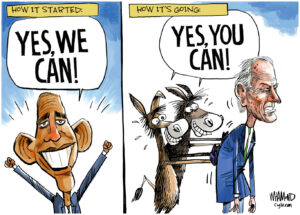Ecosocialism: One Man’s Vision for a Green Economy
According to activists such as Chris Williams, capitalism is designed for infinite growth, but the planet is not.
By Thomas Hedges, Center for Study of Responsive Law
At the recent Forward on Climate Rally in Washington, D.C., some 45,000 people brandished picket signs with logos modeled after the one President Obama used in his campaign. It was a display meant to reassure Obama that the environmental movement in the United States has not broken its allegiance to his presidency.
The Feb. 17 march was an expectant and hopeful plea, even a celebration, because many in attendance trust that Obama will do the right thing. The crowd’s confidence that day culminated in an ebullient dance party, with many smiling and flailing their bodies on cue when the song from the Internet’s viral Harlem Shake videos dropped.
The night before, a group of about 60 activists gathered in the basement of the All Souls Church in the D.C. neighborhood of Columbia Heights. They were there to address the bigger picture and the construction of the proposed Keystone XL pipeline, which would carry oil from Canada to the U.S. Gulf Coast. They were sullen and did not share the enthusiasm of the next day’s protesters.
Writer and activist Chris Williams, former Green Party presidential candidate Jill Stein and Solidarity Saturday student activist Nick Davenport belied the general optimism in a panel discussion titled “Capitalism Is Killing the Planet: How Can We Fight Back?”
Behind them hung a banner that said “System Change, Not Climate Change,” a message that seemed directed more toward the demonstrators than those on the Hill or K Street, where lobbyists work.
“February 17 should mark the beginning of a more united, grass-roots climate movement with no illusions in the free market or the Democratic Party,” read a statement from the Ecosocialist Contingent, a coalition of groups fighting global warming that organized the panel.
The groups belong to the ecosocialist movement, which overlaps with Occupy and centers on ecology as the principal contradiction to capitalism. Whereas capitalism is designed for infinite growth, the planet is not, members contend. The movement, which shifted from local to global focus with the creation of the Ecosocialist International Network in 2007, asserts that labor abuse and the destruction of the planet’s ecosystem are inexorably linked.
“It’s a linear system,” panel participant Chris Williams, author of “Ecology and Socialism,” said about capitalism. “Inputs go in at one end — which would be natural resources, energy and human labor– and then out of the other end come commodities and waste … the opposite of how nature and ecosystems work.”
Williams, an adjunct professor at Pace University, said that in its celebration of the individual, capitalism is shortsighted. When resources are depleted, humans cannot thrive, he noted, whereas the planet is indifferent to our existence. It doesn’t need us.
Ecosocialists hope to block the pipeline project and use that success as motivation for a continued assault on the pillars of capitalism.
A “victory on the Keystone pipeline — making sure that it doesn’t get built,” Williams explained, “is part of a bigger strategy of asking ourselves, ‘if we can stop that, what else can we stop?’ “
Williams and other ecosocialists want to see capitalism crumble and replaced with a commons systems in which resources are owned communally. There would be rules and regulations that bar any person from controlling more resources than another.
Williams, who seems to think that institutions dictate human behavior, stands in opposition to figures like activist and 350.org founder Bill McKibben, who believe that a grass-roots movement will persuade Obama and the Democratic Party to act in the public’s interest and reject the pipeline.
“Once you accept the limitations imposed by the system and try to work within it,” Williams said, “then you immediately run into insurmountable problems.
“Obama is not an ally,” he argued. “He runs the American empire.”
If the pipeline “doesn’t get approved it will be because of us,” Williams proclaimed, “and not [because of] Obama coming to his senses.”
This article was made possible by the Center for Study of Responsive Law.
Your support is crucial…With an uncertain future and a new administration casting doubt on press freedoms, the danger is clear: The truth is at risk.
Now is the time to give. Your tax-deductible support allows us to dig deeper, delivering fearless investigative reporting and analysis that exposes what’s really happening — without compromise.
Stand with our courageous journalists. Donate today to protect a free press, uphold democracy and unearth untold stories.









You need to be a supporter to comment.
There are currently no responses to this article.
Be the first to respond.